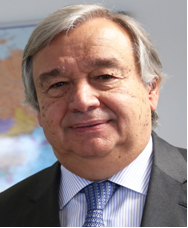安东尼奥·古特雷斯

安东尼奥·古特雷斯于1949年4月30日出生于葡萄牙首都里斯本。1991年至2002年,他任葡萄牙议会议员。2000年初,他担任欧洲委员会主席,主导通过了“里斯本议程”,共同主持了第一次欧洲联盟-非洲首脑会议。2005年6月15日,出任难民事务署高级专员,任期为3年。
多年来,古特雷斯先生积极参与社会党国际,这是社会民主政党的世界性组织。1999年至2005年中,他曾担任社会党国际主席。此外,他还创办了葡萄牙难民理事会,以及葡萄牙消费者协会DECO,担任Centro de Acção Social Universitário主席,这个组织于1970年初在里斯本贫困社区开展社会发展项目。
2016年10月6日,联合国安理会15个成员国一致同意,提名安东尼奥·古特雷斯担任下任联合国秘书长。2017年1月1日,联合国第九任秘书长古特雷斯正式上任,任期从2017年1月1日起至2021年12月31日。
António Guterres
Term of Office: 2017 till now
Guterres was born and raised in Lisbon, Portugal, the son of Virgílio Dias Guterres (1913–2009) and his wife Ilda Cândida de Oliveira (born 1923).
He was educated at the Camões Lyceum (now Camões Secondary School) where he graduated in 1965, winning the National Lyceums Award (Prémio Nacional dos Liceus) as the best student in the country. He studied Physics and Electrical Engineering at Instituto Superior Técnico in Lisbon. He graduated in 1971 and started an academic career as Assistant Professor teaching Systems Theory and Telecommunications Signals, before leaving academic life to start a political career.
Guterres was a member of the team that negotiated the terms of Portugal’s entry into the European Union in the late 1970s. He was a founding member of the Portuguese Refugee Council in 1991.
In 1992, after the Socialists' third consecutive defeat in Parliamentary elections, Guterres became Secretary-General of the Socialist Party and leader of the opposition during Aníbal Cavaco Silva's government. At the time, he was the party's third leader in six years. He was also selected as one of the 25 vice-presidents of the Socialist International in September 1992. His election represented a break with tradition for the Socialists: not only was Guterres not associated with either the faction around then-President and former Prime Minister Mário Soares or the party's left wing lead by Guterres' predecessor Sampaio, but he was also a devout Catholic, running counter to the party's historical secularism. He sought to consult with Portugal's civil society in formulating policy, meeting a range of intellectuals, scientists and entrepreneurs from across the country and the political spectrum in the run-up to the next general election.
Guterres was elected UN High Commissioner for Refugees in 2005. In 2005, following Guterres’ proposal, George Papandreou was elected Vice President of the Socialist International; in 2006, Papandreou succeeded him as President of the Socialist International.
In May 2005, Guterres was elected High Commissioner for Refugees for a five-year term by the UN General Assembly, replacing Ruud Lubbers